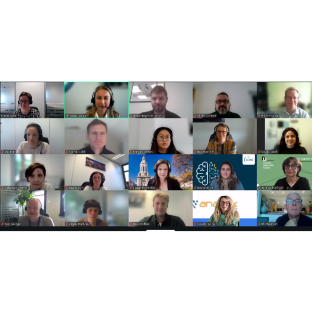On 18 November 2025, Alzheimer Europe hosted a session of its popular online Alzheimer’s Association Academy, dedicated to “Involving under-represented groups in research”. The Academy is a series of online capacity-building workshops bringing together representatives of national Alzheimer’s associations with members of the European Working Group of People with Dementia (EWGPWD) and European Dementia Carers Working Group (EDCWG), as well as representatives from pharmaceutical companies, to learn about dementia advocacy, care, policy, research and treatment, directly from experts in these fields.
The session on 18 November was the sixth of seven Academy sessions planned throughout 2025, and was moderated by Dianne Gove, Director for Public Involvement and Ethics at Alzheimer Europe. She welcomed participants from 13 countries across Europe, as well as from five pharmaceutical companies.
The first speaker, Jesper Bøgmose Hansen (University College Copenhagen, Denmark) discussed “Barriers and opportunities to involving people with dementia in care homes in research”. His presentation shared details of his work inside a care home in Denmark and some of the ways in which he was able to access and involve people in the later stages of dementia, who are not often included in research studies. The focus of his talk was split between the ethical considerations and the issues around understanding, due to the disease stage of the people with whom he was working.
Kubra Altinok (Deutsches Zentrum für Neurodegenerative Erkrankungen - DZNE, Germany) spoke next. As a person of Turkish origin living and working in Germany, she was able to share her experience helping to ensure that people from minority ethnic groups are included in research. She began by explaining some of the barriers, including cultural, linguistic and gender-related barriers, and then gave delegates some insight into strategies used in her work at the DZNE, allowing for higher levels of participation from these underrepresented groups. She recommended increasing community engagement, using translators and a more diverse research team, adopting a more personalised approach, as well as raising social awareness.
Zunera Khan (King’s College London, United Kingdom) spoke on the same topic, but in the context of conducting dementia research in the UK and especially in London, where there are many different minority ethnic groups to consider and include. She began by presenting some results from evidence-based reporting of ethnicity in clinical trials, which clearly showed the tendency for studies to involve an overwhelmingly white participant population (80%). Ethnic diversity has not improved over the past decade, she noted, and she stressed that there was an urgent need for more inclusive clinical trials, so as to better understand treatment risks and benefits across ethnic groups, thus improving dementia care for all. Some of the strategies she mentioned, to counter the existing problem, were hosting networking events to create a trusted presence within underrepresented communities, and forming strong partnerships with key stakeholders, community, researchers, students and healthcare services.
The fourth and final speaker was Eimear McGlinchey (Trinity College Dublin, Ireland), whose talk highlighted the importance of including people with intellectual disability in research. Her particular focus was on people with Down syndrome, which is considered a genetically determined form of Alzheimer’s disease (AD), and leads to Down syndrome-related Alzheimer’s disease (DSAD). She shared a number of considerations and reasonable adjustments that could be made by researchers in order to ensure people with Down syndrome were properly included and suggested that the dementia research community should include the voices of people with Down syndrome in the conversation around dementia. She ended her presentation with a series of short videos, created by the European Down syndrome Consortium, featuring people with Down syndrome explaining how important it was to them, to be included in dementia research.
A huge thank you to all speakers and participants at the Academy of 18 November, for making this such an engaging session and a big thank you, also to the European Union’s Citizen’s, Equalities, Rights and Values (CERV) programme, and our Gold and Silver sponsors, Bristol Myers Squibb, Eisai, Lilly, Novo Nordisk and Roche, without whom our educational and healthcare-related activities, including these capacity-building workshops, would not be possible.
The next edition of the Alzheimer’s Association Academy, the final one of 2025, is scheduled for 9 December and will explore themes from our Dementia in Europe Yearbook 2025 which looks at “Transport and access to cultural life, recreation, leisure and sport”.
Alzheimer Europe hosts a session of its popular online Alzheimer’s Association Academy, dedicated to “Involving under-represented groups in research”
18/11/2025
